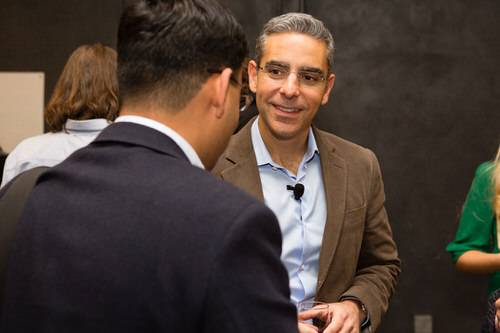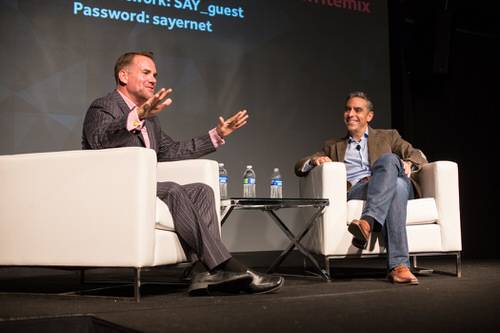In one salty word, PayPal president David Marcus summed up how he’s changing a company whose reputation for innovation and customer service had taken a dive before he took over.
Executives who say they don’t have time to respond to customers on social media?
“It’s bullshit,” Marcus told me on stage at our latest ReadWriteMix event in San Francisco on Tuesday evening. “If you lead a company, you’re the master of your calendar. You need to know what’s important and what’s not. For me, my customers are my number one priority and that’s it. If someone has an issue, no matter who you are or how big or small you are, it’s our mission to solve it for them. And I’m fanatical about this.”
Indeed, you just have to check Marcus’s Twitter stream to see him in action: Plainspoken, forthright, and funny, he’s the same on social media as he is on stage or in a private chat.

A No-BS Chief
As the head of the eBay-owned payments business, he’s had a lot of excrement to deal with.
“We sometimes, on some topics, fell asleep at the wheel,” he said.
PayPal’s been growing quickly, and his predecessors deserve credit for building out a huge infrastructure to handle $180 billion a year in transactions. But he also found an engineering team that wasn’t organized to develop products rapidly, developers who were frustrated with PayPal’s tools, and merchants and consumers who weren’t always pleased with the service they got.

He’s made strides on all those fronts, taking PayPal’s programmers onto a system called agile methodology that’s favored by startups. He’s retrained PayPal customer service to be more responsive to the concerns of small merchants, including crowdfunders. And he bought Braintree for $800 million, adding an organization geared around the concerns of developers, from the design of their application programming interfaces to their friendly call-center staff.
Cleaning up those problems has allowed Marcus to focus on the future of the business—which is the future of money. Here’s how Marcus defined it:
I think that cash was Money 1.0. Plastic to me is Money 2.0, and when I say plastic, it’s consumer credit cards and all of the good things that this great country has been built on. And then there’s Money 3.0, which is, for me, mobile…. Ultimately, all of these things will converge to mobile. And we hope to make it PayPal on mobile, but all of these things will converge to mobile. And cash will still be out there for a while but for reasons we can’t necessarily change or control.
Marcus revealed that he went door-to-door talking to small businesses before he came up with new ideas like PayPal Beacon, a device that identifies PayPal app users in a store so they can pay for a purchase by giving their name at the cash register.
He’s also changing the checkout experience to deemphasize paying with a bank account—a method which has long helped pad PayPal’s bottom line, since bank-account transfers are cheaper for PayPal to process, but which annoys some users.
“I always feel like PayPal is trying to trick me” into using my bank account to pay, I observed.
“Well, that’s over,” Marcus said. He elaborated:
My point of view on this is that you cannot win over a very long sustained period of time if you don’t do what your customers want to do. You can’t go against their will…. Because the day will come where they will have an opportunity to get some payback for that thing you did to them, and they’ll do it. They’ll take that chance.

The Next Wave Of Money
PayPal needs to keep the faith with consumers, merchants, and developers in this transition to mobile payments—which Marcus says is coming faster than we expect.
Within four years, he predicted, “If you’re in an advanced metro area in US or Western Europe or Asia, you will not have to carry your wallet to buy things.”
And the existing payments infrastructure needs to change, as the Target hack which exposed more than 100 million customers’ credit and debit cards.
If those Target customers had been paying with PayPal—an option available at stores like Home Depot, but not yet at the discount retailer—they wouldn’t have had their card or PIN numbers exposed, Marcus said.
“We don’t share your financial details with merchants,” he explained. “That’s foundational to our business.”
New systems like chip-and-PIN cards also help shield account numbers from merchants, but they don’t work for mobile apps, Marcus said. So PayPal’s working with Visa, MasterCard and American Express on alternative approaches like “digital tokenization”—a short piece of code that hides card numbers while giving card networks the information they need to assess risk and process a transaction.
Finally, there’s Bitcoin. Marcus elaborated on his prediction that Bitcoin won’t become a true currency in 2014. Its price is too volatile for merchants, who like to set fixed prices. As it settles down, that may change. (It may already be changing: This week, TigerDirect, an electronics retailer, announced it would start taking Bitcoin.)
For now, Marcus said, Bitcoin is “just a great protocol”—like TCP/IP, the fundamental Internet protocol, but for money. For now, PayPal will have to wait until regulators around the globe decide how to handle it before PayPal can start transacting in it, he added.
Here are highlights of my talk with Marcus:
And here’s a clip of the entire talk:
Got more questions for Marcus? Try him on Twitter.










